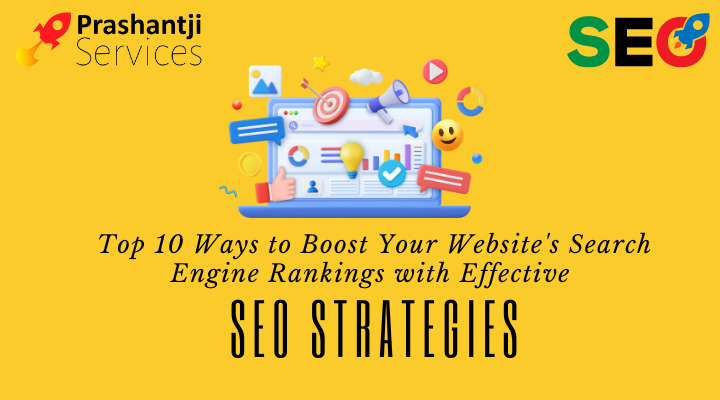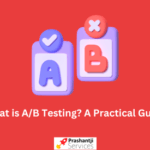10 Effective SEO Strategies for Boosting Your Website’s
In today’s digital age, having a strong online presence is crucial for any business or organization. However, simply having a website isn’t enough – it needs to be optimized for search engines in order to attract and engage potential customers. In this blog post, we’ve compiled the top 10 ways you can boost your website’s search engine rankings with effective SEO strategies. From keyword research to link building, we’ll cover everything you need to know to take your website to the next level and drive more traffic than ever before!
Introduction to SEO Strategies
SEO is an important tool for any website looking to rank high in search engine results pages (SERPs). By optimizing their website content and structure for search engines, website owners can improve their chances of appearing higher in SERPs for relevant queries. However, SEO is not a foolproof method, and there are many factors that affect a website’s ranking. In this article, we’ll discuss some of the top ways to boost your website’s search engine rankings with effective SEO strategies.
1. Research Keywords: Researching the right keywords is an essential part of any SEO strategy. Knowing which keywords are most likely to be used by potential customers can help you create content that is more likely to be found by search engines and, in turn, rank higher.
2. Optimize Your Content: Once you’ve researched the best keywords for your website, you need to make sure your content is optimized to target those words effectively. This involves using the right keyword density and formatting your content correctly with titles, headings, and meta tags.
3. Build Quality Links: Quality backlinks from other websites are key to improving your website’s ranking in SERPs. You can start building quality links by writing guest posts on other websites or submitting press releases about your company to relevant news outlets.
4. Monitor Your Progress: Finally, it’s important to monitor your progress over time with SEO tools like Google Analytics or Moz Pro. Tracking how well your website ranks for certain keywords will help you identify areas where you need to improve and adjust your SEO strategy accordingly.

1. Research Keywords
The goal of any good SEO strategy is to improve your website’s search engine rankings. One of the best ways to do this is by using effective research keywords.
There are a few different ways to go about finding the right keywords for your website. The first step is to think about what your website is about and what kind of keywords would be most relevant to your content. You can also use keyword research tools like Google AdWords Keyword Planner and Moz Keyword Explorer to find popular keywords that are relevant to your website.
Once you have a list of potential keywords, you need to start incorporating them into your website’s content. Use them in your page titles, meta descriptions, headings, and throughout the body of your content. Be sure not to stuff your keywords too much or else you could get penalized by Google. Just use them naturally throughout your content so that they flow well and are relevant to what you’re talking about.
If you follow these tips, you should see a nice boost in your website’s search engine rankings. Research keywords are an important part of any good SEO strategy, so make sure you take the time to find the right ones for your website.
2. Optimize Content for Search Engines
To help improve your website’s search engine rankings, it’s important to optimize your site’s content for the search engines. This means making sure that your content is keyword-rich and relevant to your target audience.
Here are some tips for optimizing your site’s content:
1. Use keyword-rich titles and descriptions.
2. Write unique and original content.
3. Make sure your content is relevant to your target audience.
4. Use social media to promote your content.
5. Regularly update your content
6. Link to other relevant webpages.
7. Ensure your website is optimized for mobile devices.
8. Monitor and analyze your results with tools such as Google Analytics or other SEO tools.
3. Use Meta Tags and Descriptions
When you want potential customers to find your website through a search engine, using the right meta tags and descriptions can help. Meta tags are brief snippets of text that describe the contents of a web page; they are placed within the HTML code of a website. Search engines use these tags to understand what a website is about and how it should be categorized. The most important meta tags for SEO are the title tag, meta description, and meta keywords tag.
The title tag tells search engines what the page is about and is the first thing people see when they do a search. The meta description appears under the title in the search engine results pages (SERP), and gives people an idea of what they will find on your page. The meta keywords tag is no longer used by most major search engines, but it can still be helpful to include.
To optimize your website for search engines, make sure to use relevant and keyword rich titles, descriptions, and keywords. Keep your titles short (50-60 characters) and make sure they accurately reflect the content on your page. Write unique and compellingmeta descriptions that are no more than 155 characters long, and include relevant keywords for your page. And whilemeta keywords are not as important as they once were, including 1-2 relevant keywords can help your website’s ranking.
4. Create Quality Backlinks
In order to improve your website’s search engine rankings, one of the most effective SEO strategies is to create quality backlinks. Backlinks are links from other websites that link back to your site. The more high-quality backlinks you have, the higher your site will rank in search engine results pages (SERPs).
There are a few ways to create quality backlinks. One way is to submit your website to directories. This will give your site exposure to a new audience and help build up your backlink profile. Another way is to guest post on other blogs or websites in your industry. This is a great way to get your name and website out there, as well as build relationships with other bloggers or webmasters. You can also participate in online forums and include a link to your website in your signature. This will help you get traffic from interested users and also create backlinks.
Creating quality backlinks is an important part of any SEO strategy. By taking the time to create high-quality links, you can boost your website’s SERP ranking and drive more traffic to your site
5. Optimize Images
It’s no secret that images can make or break a website. Not only do they play an important role in the overall design, but they can also contribute to your site’s search engine rankings. That’s why it’s important to optimize your images for both SEO and usability.
Here are a few tips to help you get started:
1. Use descriptive file names: When naming your image files, be sure to use keywords that accurately describe the subject matter. This will help both users and search engines understand what the image is about.
2. Add alt text: In addition to a descriptive file name, you should also add alt text to each of your images. This text helps users who are unable to see the image and provides another opportunity to include keywords for SEO purposes.
3. Choose the right format: There are a number of different image formats, but not all of them are created equal. For web use, JPEGs and PNGs are typically the best options. GIFs can also be used in some cases, but they’re generally reserved for smaller images like logos or icons.
4. Resize images appropriately: Images that are too large or too small can negatively impact your website’s performance. Be sure to resize your images before uploading them so that they’re just the right size for your needs.
5. Compress files for faster loading: Image file sizes can impact page load times, so it’s important to keep them as compressed as they are.

6. Increase Page Load Times
- Use a content delivery network (CDN).
- Optimize your images.
- Minimize HTTP requests.
- Reduce the number of plugins you use.
- Put CSS at the top and JavaScript at the bottom of your code.
- Avoid landing page redirects.
- Enable compression.
- Use browser caching.
- Minify your HTML, CSS, and JavaScript code.
- Use a faster web hosting provider.
7. Utilize Social Media Platforms
If you want to improve your website’s search engine rankings, utilizing social media platforms is a great way to do so. By creating and sharing content on social media sites, you can increase your website’s visibility and drive traffic back to your site. Additionally, engaging with your audience on social media can help build relationships and create brand loyalty.
When using social media for SEO purposes, it’s important to focus on quality over quantity. Posting relevant, well-written content that provides value to your audience is more likely to generate engagement than posting multiple times a day with no substance. In addition, make sure to include links back to your website in your social media posts so that people can easily find your site.
By following these tips, you can use social media to boost your website’s search engine rankings and drive more traffic to your site.
8. Improve User Experience
If you want to improve your website’s search engine rankings, one of the most effective things you can do is focus on improving the user experience. There are a number of ways to do this, but some of the most effective include creating compelling content, making sure your website is easy to navigate and use, and ensuring that your site loads quickly. By taking steps to improve the user experience on your site, you’ll not only improve your search engine rankings, but you’ll also make it more likely that visitors will stick around and become customers or clients.
9. Monitor Your Competitors
If you want to stay ahead of the competition, you need to keep an eye on what they’re doing. There are a few ways to do this:
- Set up Google Alerts for your competitor’s name and any relevant keywords. This will send you an email anytime there’s new activity related to your competitor.
- Check their website regularly to see what changes they’ve made and what new content they have.
- Follow them on social media and pay attention to their engagement levels. See what content gets the most reactions and try to replicate that on your own channels.
- Subscribe to their email list or newsletter and pay attention to what they’re offering. See if there are any ideas you can borrow or ways you can improve on their offer.
- Read reviews of your competitor’s products and services on sites like Yelp and Amazon. This will give you an idea of what customers think about their offerings.
10. Optimize for Local Searches
If you want to improve your website’s search engine rankings, one of the most effective things you can do is to optimize your site for local searches. This means making sure that your site appears as high up in the results as possible when people search for keywords related to your business in their local area.
There are a number of things you can do to optimize your site for local searches. One is to make sure that your site is listed on all the major local directories, such as Google Places, Yelp, and Foursquare. Another is to make use of local keyword research to ensure that the keywords you’re targeting are ones that people in your area are actually searching for.
It’s important to create informative and keyword-rich content that includes mention of your city or region. By doing all these things, you’ll stand a much better chance of ranking highly in local search results and driving traffic to your website from potential customers in your area.

conclusion
An effective SEO strategy can be the difference between a successful website and one that struggles to attract visitors. There are many factors to consider when optimizing your website for search engines, but some of the most important include:
- Keywords: Identify the key phrases and words that potential customers are using to search for businesses like yours. Then, make sure these keywords are included in your website content, titles, and meta tags.
- Links: Search engines use links to crawl the web and determine the relevancy of your site. So, focus on building high-quality inbound links from reputable websites.
- Content: Create high-quality content that is informative and valuable to your target audience. This will help you attract more attention from search engines and improve your website’s ranking.
These are just a few of the many components that make up an effective SEO strategy. By implementing these tactics, you’ll be able to provide
your website with the visibility it needs to attract more visitors and generate more sales.








